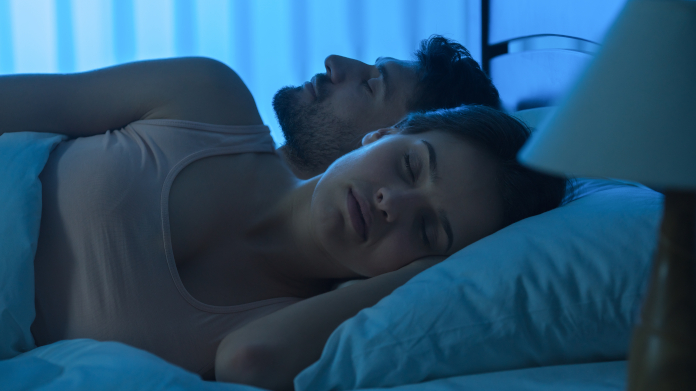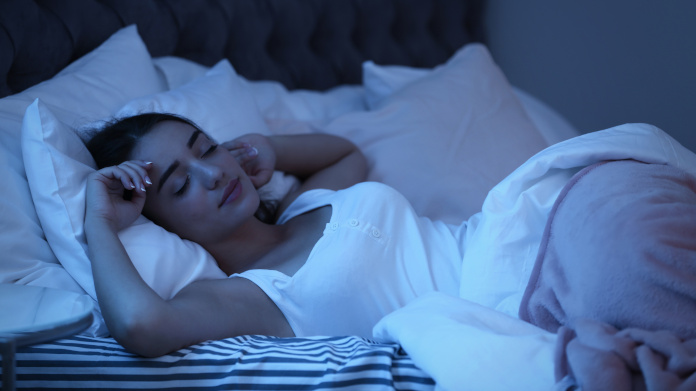Too much screen time: how can we protect ourselves from blue light?
Smartphones, tablets, computers, televisions ... these days, screens are omnipresent in our daily lives. Unfortunately, though, they emit blue light which can have a number of adverse effects.

What is blue light?
Increasingly present in our day-to-day lives, screens expose us to blue light, a visible part of the electromagnetic spectrum. In fact, there are different types of light rays – some visible, such as blue light, and others invisible, such as ultraviolet or infra-red. When visible light rays enter the eyes, a message is sent to the brain which then interprets them as what we see.
Each ray in the light spectrum has a specific wavelength and a different colour. Characterised by a wavelength between 380 and 500 nanometers, blue light actually includes a range of colours from ‘blue-turquoise’ to ‘blue-violet’. Specialists tend to distinguish between ‘blue-turquoise’ which has an effect on the sleep/wake cycle, and ‘blue-violet’ which is harmful to eye health.
What are the consequences of overexposure to blue light?
Many experts are sounding the alarm over the risks of too much exposure to blue light. It can have a number of effects on the body, particularly the eyes, with red eye, stinging, or a burning sensation among the common symptoms of excessive exposure to ‘blue-violet’ light. These symptoms indicate eye fatigue which is often accompanied by dry eye, headaches and migraine.
Excessive exposure to the ‘blue-turquoise’ light emitted by screens can also have an effect on the quality of our sleep as it stimulates the retina and disrupts the synthesis of melatonin. Often referred to as the ‘sleep hormone’, melatonin plays a key role in sleep-wake phases. Sleep problems such as falling asleep, insomnia, or difficulty waking up, can all be caused by the ‘blue-turquoise’ light emitted by our screens.
What are the long-term risks?
A number of scientific studies have investigated the long-term impact of blue light. Researchers believe that prolonged exposure could have irreversible effects on the eyes. It may cause premature aging of the eyes and the development of vision problems, particularly age-related macular degeneration (AMD) and cataracts. This is why eye specialists are calling for better prevention against the risks of blue light.
What solutions are available for protecting ourselves against blue light?
While the best response would be to reduce our exposure to blue light, this is increasingly difficult given how screens now dominate daily life for many of us. Nonetheless, vision and sleep specialists do recommend cutting down our screen time and exposure to blue light as much as possible, particularly before going to bed. For a few years now, opticians have also been suggesting we wear blue light-blocking glasses to reduce the risks to our eyes.
Another way of protecting ourselves against the dangers of blue light is to boost the eyes’ defenses with the aid of natural compounds. Lutein, for example, is a substance known to play a protective role in the retina. A yellow pigment from the carotenoid family, it works both as an ‘anti-blue light filter’ and an antioxidant. Other natural antioxidants, such as anthocyanosides from blueberries, also offer benefits in protecting eye tissue. Combining a selection of the best photo-protective agents, synergistic formulations such as OptiVision can also be used to prevent vision-related problems.
Keywords
4 Days
Availability of quality health…
Availability of quality health supplements and it's wide variety is impressive. Ordering is seamless and shipping even during the holidays is well streamlined.
Mohamad Hussein
18 Days
A Product worth waiting for when not…
A Product worth waiting for when not available and then arriving as a surprise!
DOMINIC
20 Days
On time shipping
On time shipping
GEORGE Verne
21 Days
Ordering was easy and the product was…
Ordering was easy and the product was delivered with no problems. Appreciated that I was notified when it would arrive. Thanks!
MascarC
27 Days
Great customer service - responsive …
I ordered from them and my item was unavailable for sometime. I was super happy when they reactivated my order and shipped my item which arrived very quickly. Great customer service.
Ruth Rueter
28 Days
Super fast shipping
Super fast shipping
Donald Borling
31 Days
Reputable companysearch and the number of…
The research and the number of selection of products.
NAKHJAVAN Shervin
44 Days
The Anti Aromatase is a great product
The Anti Aromatase is a great product. You just need to have constant inventory. Recently this product has been out of stock.
GEORGE Verne
46 Days
Great help on chat
Great help on chat. Knowledgeable and friendly.
Jason Argos
49 Days
Customer service was fast and friendly.
Customer service helped to stop the transaction process of the subscription. I appreciated that.
Greenie
50 Days
I order here due to the high quality of…
I order here due to the high quality of the products and the quick delivery of items - thank you
Barbara J
51 Days
SuperSmart's Eye Pressure supplements: highly recommended!
I purchase SuperSmart's Eye Pressure supplements regularly for over 5 years, and gotta say they are truly a wonderful product for my Glaucoma. Highly recommended if you have eye pain from your Glaucoma.
D. Martinez
55 Days
Quick service
Quick service
MONELL
56 Days
Speedy service.
Speedy service.
ROSENTHAL Marvin
60 Days
Clear website- Efficient
Clear website. Excellent search engine and fast delivery!
Mohamad Hussein



